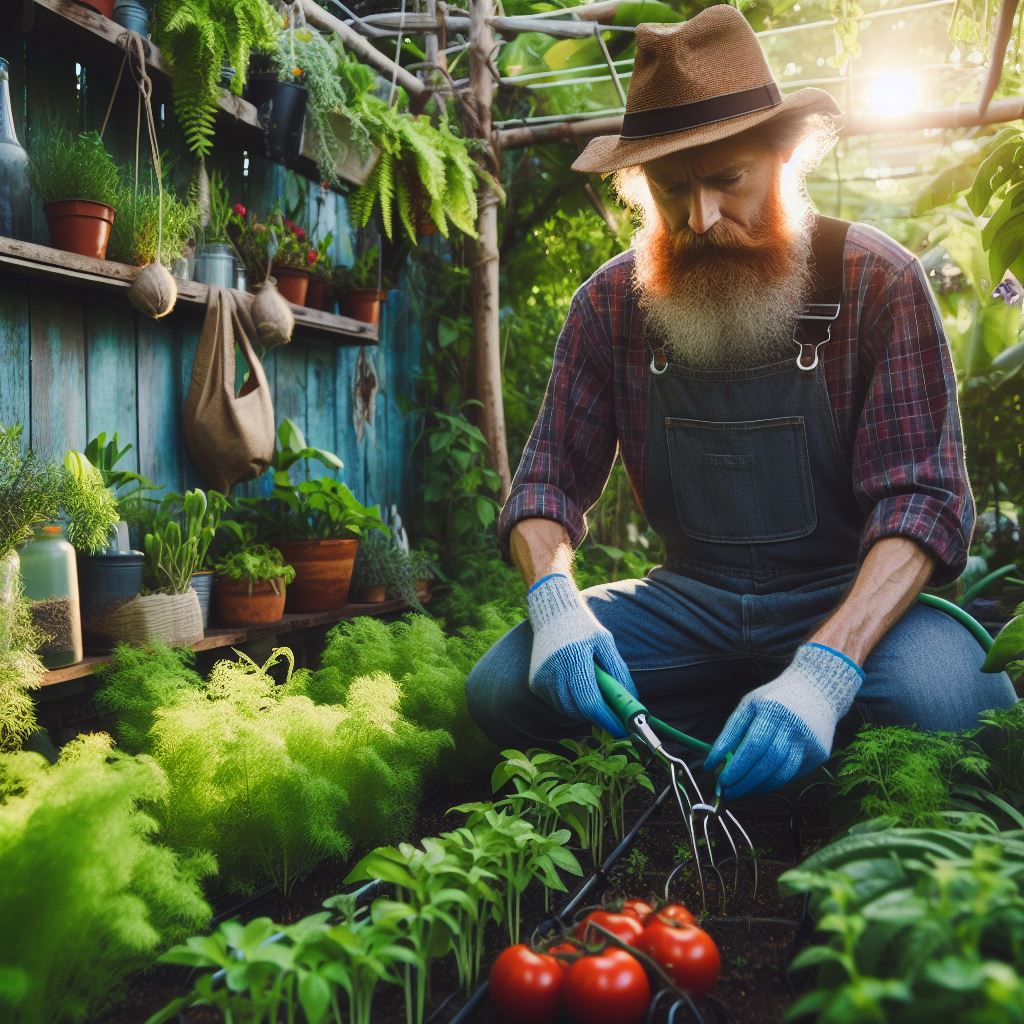Introduction
Garden pests like insects, weeds, and plant diseases can destroy fruits, vegetables, and ornamentals.
Conventional pesticides effectively control pests, but have drawbacks like toxicity and harm to beneficial species.
This underscores the need for alternative pest prevention strategies.
Preventing pests naturally is key to growing robust, productive gardens without chemicals.
There are several effective, eco-friendly prevention methods.
Choose resistant crop varieties bred to deter common pests.
Use row covers as physical barriers against insects.
Rotate plant families between beds each season to disrupt pest life cycles.
Maintain healthy soil with compost to strengthen plants.
Remove weeds and diseased debris that harbor pests.
Use beneficial insects like ladybugs and lacewings that prey on pests.
Spray neem oil or insecticidal soaps to deter early infestations.
Trim away infected leaves and limbs to slow disease spread.
With diligent monitoring and a combination of these organic tactics, gardens can stay productive while minimizing pests naturally.
Eliminating pest entries, early intervention, and promoting plant health are key principles.
Transform Your Agribusiness
Unlock your farm's potential with expert advice tailored to your needs. Get actionable steps that drive real results.
Get StartedNatural prevention reduces pest pressure, making occasional treatments with safer organic products successful.
The result is an abundant, sustainable garden.
Read: Fighting Fungi: Organic Methods
Identifying Common Garden Pests
Description of common garden pests
- Aphids: Small, soft-bodied insects that feed on the sap of plants, causing curling leaves and stunted growth.
- Slugs: Slimy creatures that leave behind trails of mucus and feed on various garden plants, resulting in irregular holes in leaves.
- Snails: Similar to slugs, these shell-bearing pests devour plants at night and hide in damp areas during the day.
- Caterpillars: Larval stage of butterflies and moths, they chew on leaves and stems, causing extensive damage to plants.
Importance of understanding specific pests that affect garden plants
- Targeted pest control: By identifying the exact pests, you can choose the most effective methods to combat them.
- Prevention measures: Understanding specific pests allows you to implement preventive strategies before they become a problem.
- Minimize damage: Knowing which pests to watch out for helps minimize damage to your garden plants.
- Environmental impact: Proper identification allows you to choose eco-friendly control methods that do not harm beneficial insects.
Description of common garden pests
Now that you can recognize some common garden pests, let’s delve deeper into understanding their characteristics and behavior.
Aphids
Aphids are tiny insects that come in various colors, such as green, black, or brown.
They reproduce rapidly, so a small infestation can quickly grow into a major problem.
Aphids extract sap from plants using their piercing mouthparts, causing wilting, yellowing, or distorted leaves.
They also secrete a sticky substance called honeydew, attracting ants and leading to the growth of black sooty mold.
Slugs
Slugs are soft-bodied, shell-less mollusks that thrive in moist conditions.
They are primarily active during the night, feeding on leaves, stems, and plant debris.
Their feeding leaves behind holes, and their slime trails are a telltale sign of their presence.
Slugs love vegetables, hostas, and other tender plants, making them a common nuisance in gardens.
Snails
Snails are similar to slugs, but they carry a protective shell on their backs.
They have a similar voracious appetite and feeding habits, targeting a wide range of garden plants.
Snails prefer damp and shady areas, hiding during the day and emerging at night to feed.
Their feeding marks often appear irregular, with smooth edges on damaged leaves.
Caterpillars
Caterpillars are the larval stage of butterflies and moths.
They have a soft, segmented body with a head capsule, usually covered in distinctive hairs or bristles.
Caterpillars feed voraciously on leaves and stems, often skeletonizing or completely defoliating plants.
They can cause significant damage to ornamental plants, fruit trees, and vegetable crops.
Understanding these common garden pests allows you to take proactive measures to prevent or control infestations.
Integrated Pest Management (IPM) techniques, such as planting pest-resistant varieties, practicing proper sanitation, attracting beneficial insects, and using physical barriers, can help reduce the impact of these pests on your garden.
By taking the time to identify and understand the specific pests that affect your garden plants, you can create a healthy and thriving garden environment that is resistant to pests and disease.
Read: Safe & Effective Natural Pesticides
Showcase Your Farming Business
Publish your professional farming services profile on our blog for a one-time fee of $200 and reach a dedicated audience of farmers and agribusiness owners.
Publish Your Profile
Learn More: Tiny Space, Huge Taste: Easy-to-Grow Herbs
Natural Pest Control Methods
Pests are a common nuisance in gardens, often causing damage to plants and frustrating gardeners.
However, there are various natural pest control methods that can help prevent and manage these unwanted invaders without resorting to harmful chemicals.
Companion planting
Companion planting involves growing certain plants together to enhance their growth and repel pests.
Some plants have natural abilities to emit chemical compounds that repel insects.
For example, marigolds emit a scent that deters nematodes, while basil repels mosquitoes and flies with its strong aroma.
By strategically planting these companion plants alongside susceptible crops, gardeners can deter pests and protect their plants naturally.
Introducing beneficial insects
Beneficial insects play a vital role in natural pest control by preying on garden pests.
Ladybugs, for instance, are voracious consumers of aphids, which are notorious for damaging plants.
Lacewings are another example of helpful insects that feed on mites and caterpillars.
By attracting and introducing these beneficial insects into the garden, gardeners can ensure a natural balance, where the pests’ population is kept under control.
Using physical barriers
Physical barriers are an effective means of keeping pests away from plants.
Row covers, made of lightweight fabric, can be draped over plants to prevent insects, such as beetles and moths, from reaching them.
Netting serves as an excellent defense against birds, rabbits, and other animals that may devour garden produce.
By implementing these physical barriers, gardeners can protect their plants from external threats and significantly reduce pest damage.
Organic sprays and deterrents
Organic sprays and deterrents are another natural pest control option.
These sprays are made using natural ingredients that deter pests without causing harm to the environment or human health.
For example, a mixture of garlic, pepper, and water can be sprayed on plants to repel insects like aphids, caterpillars, and beetles.
Similarly, a blend of neem oil, soap, and water can deter pests and serve as an insecticidal spray.
These homemade remedies offer an alternative to chemical-based pesticides and promote eco-friendly pest control practices.
In a nutshell, preventing garden pests naturally is both possible and beneficial.
Companion planting, introducing beneficial insects, using physical barriers, and employing organic sprays provide effective alternatives to chemical pesticides.
By embracing these natural methods, gardeners can protect their plants, promote biodiversity, and contribute to a healthier and sustainable garden environment.
Read: Garlic Spray: Natural Pest Deterrent
Best Practices for Pest Prevention
Promoting plant health
One of the best ways to prevent garden pests naturally is by promoting the overall health of your plants.
When plants are strong and healthy, they are less likely to attract pests. Here are some tips for maintaining plant health:
- Provide adequate watering: Make sure your plants receive the right amount of water. Avoid over-watering, as it can create a damp environment that attracts pests.
- Check soil quality: Ensure that the soil has proper drainage and is rich in organic matter. Healthy soil promotes healthy plant growth and makes them more resistant to pests.
- Provide proper nutrition: Fertilize your plants regularly with organic fertilizers to ensure they receive essential nutrients. Healthy plants have a better defense against pests.
Regular monitoring
Regular monitoring of your garden is crucial for early pest detection and effective pest control.
By keeping an eye on your plants, you can identify pest infestations before they become a major problem.
Here’s how you can stay on top of the situation:
- Check plants regularly: Inspect your plants frequently, looking for signs of damage, discoloration, or unusual pests. Early detection can help prevent pests from spreading.
- Act immediately: If you notice any signs of pest activity, take immediate action. Implement organic pest control methods or consult a professional if necessary.
Maintaining garden cleanliness
Cleanliness is essential in keeping pests away from your garden.
Good garden hygiene practices can significantly reduce the risk of pest infestations.
Follow these steps to maintain a clean garden environment:
- Encourage good hygiene: Remove weeds regularly, as they can harbor pests. Keep the garden clean and weed-free to discourage pests from settling in.
- Proper disposal of plant debris: Remove fallen leaves, plant trimmings, and other debris from the garden. These can provide hiding places for pests.
- Clear fallen fruits or vegetables: Promptly remove any fallen fruits or vegetables from the ground. Rotting or overripe produce attracts pests.
By following these best practices for pest prevention, you can protect your garden naturally without the need for harmful chemical pesticides.
Promoting plant health, regular monitoring, and maintaining garden cleanliness are all essential steps in creating a pest-resistant garden.
Stay vigilant and take proactive measures to ensure a healthy and thriving garden environment.
Read: Biocontrol: Nature’s Pest Management
Gain More Insights: Permaculture in Small Urban Gardens
Gain More Insights: Small Garden? Big Harvest Vegetable Tips
You Might Also Like: Rooftop Herb Havens: Cultivating Flavor
Conclusion
Throughout this blog post, we discussed various natural methods to prevent garden pests.
Showcase Your Farming Business
Publish your professional farming services profile on our blog for a one-time fee of $200 and reach a dedicated audience of farmers and agribusiness owners.
Publish Your ProfileBy utilizing these methods, you can avoid harmful chemical pesticides and protect the environment.
We strongly encourage you to implement these natural pest control methods in your own garden.
By using companion planting, attracting beneficial insects, and practicing good garden hygiene, you can effectively keep pests at bay.
Remember, prevention is key, and natural methods are not only effective but also environmentally friendly.
So, why not give them a try in your garden today?




